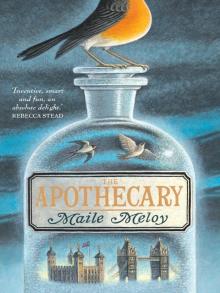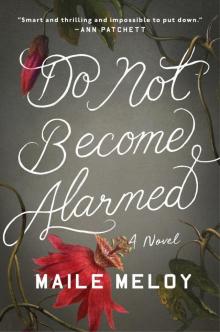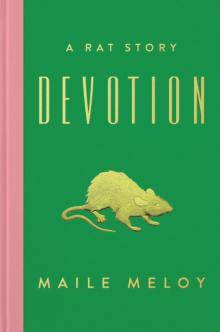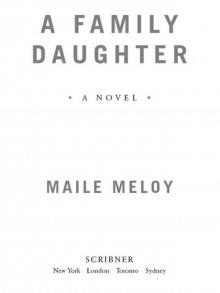- Home
- Maile Meloy
A Family Daughter Page 2
A Family Daughter Read online
Page 2
A friend told him, “Get family to help you. There’s nothing like family, you can’t trust anyone else.” But Henry’s parents were dead, and he had no siblings. He couldn’t go to Clarissa’s parents for help again, and they lived eight hours away.
So Henry hired a woman named Maricruz, who seemed kind and intelligent, and had been a teacher at home in Honduras. He told her he didn’t want a lot of Catholic hocus-pocus around Abby, but the babysitter seemed fine with that. When the neighbor’s cat died, Maricruz helped bury him and told Abby that now the cat was helping to make the flowers grow. She took Abby to every lesson they offered in town—piano, tennis, swimming, jazz dance, Drawing on the Right Side of the Brain—but what Abby learned best was Spanish from Maricruz.
When his caseload and his household were under control, Henry took Abby to Hawaii for her eighth birthday, just the two of them. He wanted to show it to her before Clarissa did, to claim it for his own.
By the end of the first day of airports and taxis, and making sure Abby had books to read and food to eat, he was exhausted, and had new respect for Maricruz. The next morning they had breakfast on their balcony at an old beach hotel, and then he helped Abby catch the little waves at the beach.
After lunch, before going back into the water, Henry led his daughter into a deserted changing room to use the old-fashioned medical scale. Abby was getting taller, and he wanted to know what she weighed; it seemed like something a parent should know. A man came into the empty room with a towel around his waist and said, “What’s she doing in here?”
“We’re just using the scale,” Henry said, sliding the big weight to 50. He felt Abby’s big eyes looking up at him.
“She’s not supposed to be in here,” the man said.
“It’s no big deal,” Henry said.
“I mean it,” the man said.
“She’s eight, ” Henry said sharply, and Abby flinched.
“I don’t care!” the man said. “It’s the men’s dressing room! What the hell are you thinking?”
Henry tapped the little weight up the bar until the needle swung free and balanced. “Fifty-eight pounds,” he said. “That’s amazing.”
“I’m telling you,” the man said. “Get her out.”
Henry helped Abby off. He checked that the scale zeroed out correctly, to prove a point about his unhurriedness, and then he led Abby slowly toward the doorway to the pool. She clutched his hand and took two quick steps for each of his.
“What were you thinking ?” the man yelled at their backs. “Jesus Christ!”
Henry lifted Abby carefully to his hip and turned, at the door. “Don’t be crazy,” he said. “She’s eight.”
He could feel her heart racing against his chest and could feel his own pounding as he carried her out. He realized then that they were going to be two alone in the world.
3
AFTER THE DIVORCE, Abby went to visit her mother in the city every few weekends, riding the bus south from Santa Rosa. Clarissa lived in a single room with a Murphy bed, near the university. The kitchen was in a closet, and everything was playhouse-sized: a half stove, a small sink, a cube refrigerator. There was a little table by the window, and when the bed was folded up, there was room to move around. Clarissa had a new boyfriend, a homeopath with round glasses, who showed up in the morning with muffins from the organic bakery down the street. On Saturdays, Abby went to yoga class with her mother, and her mother bought her a yoga book for children: Be a Frog, a Bird, or a Tree . Then they went to hear drums, or singing, or poetry. On Sunday mornings they went to a meditation class and lay on the floor visualizing a path through a green forest, and a white light expanding in their hearts.
After two years, Clarissa finished her degree and came back to a rented bungalow in Santa Rosa, and they arranged for Abby to switch houses every month. Clarissa said Henry was wrong in not letting Abby experience a wider world, but Henry said there was plenty of time for the wider world, and it would be nice to let their daughter have a childhood. Abby moved each month with a duffel bag of books and clothes.
At dinner at her father’s house, it was just the two of them. He talked to her about work and his day, and he asked about school. For a while, he called her “princess” and “pumpkin,” but by the time she was twelve he had stopped. She missed the names but guessed that he had decided she was neither a princess nor a pumpkin, and it wouldn’t help her to think she was.
At her mother’s house, the boyfriends came and went. Abby played jump rope at school, on the asphalt playground, and one of the songs went
Rich man, poor man
Beggarman, thief
Doctor, lawyer
Merchant, chief
The one you missed your jump on was the one you were supposed to marry, but in Abby’s experience of her mother’s lovers, you could have the whole list. There had been her father—that was the lawyer—and a paramedic who could be the doctor. There had been a real estate investor, a cabinetmaker, a Buddhist guitar player with no job, and a writer who borrowed money from Clarissa and never paid it back. There had briefly been a handsome Navajo horse trainer who held tribal office and could count as the chief. The Joy of Sex was on her mother’s bookshelf, and her friends spotted it and demanded to see the pictures. Abby dutifully showed it to them when her mother was out, but felt a vague horror at the hairy grown-ups in the illustrations.
When she was thirteen, Abby found a letter lying open on the kitchen table, and read it in the automatic way she read anything lying out on the table. It was a letter to her mother, about wanting to make physical love to her again, and how and why, and it was signed by a man Abby knew to be married; his son went to her school. Abby left the letter there, and by dinnertime it was gone.
“I was thinking,” Abby said, making waffles for dinner, “that it might be better if I lived in one house again, all the time.”
“Is this because I didn’t make dinner?” Clarissa asked.
“No,” Abby said. “I was reading something in a magazine. They did a study and decided that joint custody isn’t as healthy for kids as they thought.”
“So you want to live with your dad?”
Abby forked a waffle off the iron and brought it to her mother’s plate. “It would be easier for him,” she said. “He has Maricruz to come cook sometimes.”
“He has Maricruz because he has money,” Clarissa said. “I’m not going to let my daughter be raised by a babysitter.”
“I think the raising part is sort of over,” Abby said.
Clarissa looked hopeless and bereft, and let the waffle sit cooling on her plate. “You were always your father’s,” she said. “He wanted a girl. And then when you were born, you looked so much like him, you were clearly just his .”
“All babies look like their fathers,” Abby said. “We evolved that way so fathers would stay and help.”
“But you were like him, too,” Clarissa said. “You would always go to him, when you started to crawl.”
“If I started with you,” Abby said, “then he was the only other person there to crawl to.”
“No,” her mother said. “There was always this bond. When you started talking, I could really tell.”
“I was a baby, ” Abby said. “You’re saying I talked like a lawyer?”
“See, you’re still like him,” Clarissa said. “You’re trying to prove me wrong, just to do it.”
Abby poured her own waffle and let the subject drop. There were advantages to her mother’s house anyway, in that there weren’t really any rules. Sometimes she had a curfew, but mostly she didn’t, and she could see how that would become useful.
She wrote letters to Jamie during those years. He loved his sister, but he understood what she was like. He came to Santa Rosa sometimes, between jobs and girlfriends, and showed up at Christmas with mix tapes for Abby. When her mother started going to a Reiki healer, who put his hands on Clarissa’s chakra points through her clothes and visualized her healing, Abby wrote to Ja
mie about it. “She says that Western medicine is so limited,” she wrote.
She says there’s incredible research and that she knows her own experience with it. But that’s what she said about the psychic who channeled her past lives (pioneer woman, French peasant). She doesn’t seem very “healed” to me.
In high school, she brought boys home, and there wasn’t any awkwardness about it. They went up to her room to kiss and joke and fumble, saying hey to Clarissa on the way. At Henry’s house, she couldn’t do that. He didn’t like any of her boyfriends, and he terrified them. He was polite enough, but the politeness was a sign of not taking the boys seriously, which made it hard for Abby to take them seriously. There was one her father called Archie, because he thought he looked like an Archie, and after a while she could only think of him as Archie, too.
When she was living at her father’s house, he stayed in and read at night, and she did, too. He had a girlfriend in Sausalito but he saw her only when Abby wasn’t there. The dinner dishes ran in the dishwasher and her father read thrillers and biographies on the couch. Abby lay sideways in the overstuffed armchair and read paperbacks off his shelves— The Electric Kool-Aid Acid Testand Helter Skelter —until he started bringing books home so she would read something else.
“How come you get to read Robert Ludlum and I have to read Wuthering Heights ?” she asked him once.
“Because I read it already,” he said.
Eventually he would close his book and put his hand on her head and go up to bed, leaving her reading under the lamp in the dark, quiet house.
4
YVETTE KNEW THEREhad been lapses of attention in the raising of Abby, and she volunteered to go with her to look at colleges. Abby, to her surprise, wanted to go to San Diego to see where Henry and Clarissa had met in the registration line at UCSD.
“Why?” Yvette asked.
“I just do,” Abby said. “They must have been happy there. I want to see what it looks like.”
Yvette remembered trees on campus, but not as many as they found there: the university was a vast eucalyptus grove. In the brochure Yvette read that the trees, with their peeling papery bark and their finger-long leaves, had been planted by the Santa Fe Railway, for use as railroad ties. “None of this was here when your mother was here,” she said. “I don’t remember any of these buildings.” The central library looked like a blocky flying saucer resting on its landing gear.
The student center curved around an outdoor stage, and there were student activities posted on one of the walls—Bi-Gay-Lesbian Movie Night, Life Drawing Class, a kosher barbecue: “Schmooze with the Jews.” A group of girls who looked Chinese spilled out of one of the doors, laughing. The students everywhere were talking and happy.
It was an intensely bright day, and Yvette wanted to rest on a bench in the shade, so Abby went to the admissions office alone. As she walked away, she looked just like one of the college students, and Yvette was amazed that this was her little Abby, grown up. A boy smiled as Abby passed, and Yvette remembered what it had been like to be at the beginning of things. But she also wanted to protect her granddaughter. The school seemed so vast—it was a place a girl could get lost in.
When Abby came back with an application packet, Yvette said, “Let’s go see the University of San Diego.”
“Isn’t that Catholic?”
“I remember it being so beautiful,” Yvette said. “It isn’t far on the map.”
Abby agreed—she was in such a good mood Yvette thought she would agree to anything—and Yvette spotted the university before they arrived; the creamy white Spanish buildings took up a whole hilltop, with towers and arched windows above the trees. They parked and walked through a silent courtyard, and a redheaded girl in a yellow skirt came out of a building.
Yvette said, “Excuse me, do you go here? My granddaughter is applying.”
The girl sized Abby up frankly. She had freckles and a turned-up nose, and Yvette guessed she was Irish.
“It’s a great school,” the girl said.
“Are the teachers priests?” Abby asked.
“It depends on the subject. One of my favorite courses was Logic, which I took from a priest. He was wonderful.”
Abby turned away to study the elaborate stucco at the tops of the buildings. Yvette asked a few more questions and then let the girl go.
“Why did you say I was applying here?” Abby asked when they were alone.
“It was just a way to ask the questions,” Yvette said.
“I really liked UCSD.”
“Don’t you think it was too large?”
“I’m going back to the car.”
“We could find the admissions office.”
“I’m not going here. You said you just wanted to see it.”
They went back to the car, and Yvette wished she had gotten Abby into confirmation classes, that summer of the chicken pox. She thought of the Jesuits: “Give me a child before the age of seven…”
Abby drove back down Marian Way, into the traffic.
“You know,” Yvette offered, “I was an adult a long time before I found my God. It wasn’t even when I was your age, it was much later. He came to me through my children, and my struggle to be a good mother. He knew I would have to be won over through my emotions; that was the only way I would come in.”
Abby ran a yellow light. On the other side of the intersection, she said, “Then he’ll know he’s not going to get me through a Logic class taught by a priest.”
Yvette decided to let it go. It would take longer for Abby to see that everything didn’t depend on logic and reason. It wasn’t her time.
5
I’M GOING TOUCSD,” Abby wrote to Jamie in the spring.
I was reading about Freud and the primal scene, about people being fixated on the scene of their own conception, and maybe it’s that. When I think about college, I see myself on that campus. My teachers keep asking why I don’t go to some east coast school. My mother thinks that’s a great idea, but then why didn’tshe do it? Those schools are all cold and expensive. You had that girlfriend from Sarah Lawrence— she was cold and expensive. I’m staying west.
When it was time to go, her mother warned her not to end up with the boy she met in the registration line. “That was such a mistake for me,” she said.
“Thanks a lot.”
“I don’t mean having you was a mistake,” she said. “I just mean marrying your dad was.”
“Isn’t that the same thing?”
“I was so young,” Clarissa said. “I was right out of Catholic girls’ school. The only boyfriend I’d had was Jimmy Vaughan.”
“I’m not getting married, and I didn’t go to Catholic school,” Abby said. “So I think I’m safe to register.”
“You’re never getting married?” her mother asked sadly.
“I just mean not now.”
“I was so young,” her mother said. “I was your age. Isn’t that strange?”
In the registration line, a boy asked Abby where she was from and if she knew what her major would be. His name was Leon, and whenever she saw him in the cafeteria, carrying a tray of food and a glass of milk, there was a dangerous thrill about saying hello to him. She described the feeling to her new roommate, Miranda, who laughed.
Miranda had rich, inattentive parents in Newport Beach and long, shiny black hair from her Japanese mother. She thought Abby’s virginity was adorable and her relationship with her parents was quaint. She loved Henry; when he took them to dinner she linked arms with him, tossing her hair. It made Abby self-conscious.
“He’s so proud of you,” Miranda said. “And you never enjoy it, you never tell him anything.”
“I don’t have to,” Abby said. “He knows.”
“I don’t mean telling him that you love him. I mean like things . You’re so lucky, you have a dad you can be close to, and you don’t take advantage of it.”
“Yes, I do.”
“No, you don’t . You take him for gr
anted.”
“Who can you take for granted, if not your parents?”
“You’ll see,” Miranda said. “Wait’ll you meet my parents, and then you’ll see.”
Time went by imperceptibly on the unchanging, eucalyptus-grove campus. There were riots in Los Angeles, and Abby called her grandparents, who were fine. Iraq didn’t pull out of Kuwait, and the war started in grainy bombing footage on the TV in the common room. Protest posters went up at the student center, and then it was over. When Sinéad O’Connor tore up the Pope’s picture, Yvette called to ask what young people thought about it, but Abby hadn’t heard it had happened.
She met Miranda’s mother, who was a plastic surgeon, and her father, who bought a hundred-thousand-dollar Hummer the week they became available to civilians. It gleamed in their driveway like a tank. He liked to say that Arnold Schwarzenegger had one, too.
They kept on as roommates; Abby couldn’t afford to move off campus, and Miranda liked the crowded friendliness and distraction of the dorms. Boys came to the room chasing her, and some of them gave up and turned their attention to Abby. The first one was on the swim team and Miranda was sure he was gay; it didn’t last long. The second was a premed who was skilled and instructive, and dispatched the virginity before leaving for Johns Hopkins with a decorous sadness and reluctance.
The last one, in Abby’s junior year, was a visiting student from the University of Palermo. His father was a Sicilian baron with no money, who hoped Gianni would find a rich American wife to shore up a crumbling house and an unlucky family. He had sent his handsome son to California to find an heiress.

 The Apothecary
The Apothecary Both Ways Is the Only Way I Want It
Both Ways Is the Only Way I Want It Do Not Become Alarmed
Do Not Become Alarmed Devotion: A Rat Story
Devotion: A Rat Story A Family Daughter
A Family Daughter